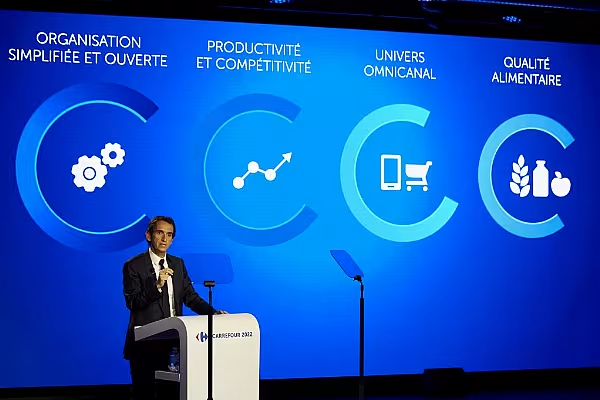Rome wasn't built in a day, and following Carrefour's first quarter results, published yesterday, CEO Alexandre Bompard will be at pains to remind shareholders that change can be a gradual process.
For the quarter, Carrefour posted a like-for-like sales increase of 0.4%, to €20.77 billion.
However, it is the group's French and European businesses' performance that are likely to garner the most attention; in France, the retailer saw a 0.1% like-for-like drop in sales, while in Europe, that decline was 0.8%.
Asia, too, was down (-3.9%), while Latin America proved a saving grace for the business, posting a like-for-like rise of 4.5%.
Coming less than three months on from Bompard announcing the ambitious Carrefour 2022 plan, which is built around four pillars: simplifying the organisation, productivity and competitiveness gains, investing in online and improving the food offer; you wouldn't expect significant changes to already have been made.
Indeed, in its statement Carrefour highlighted that work was already underway on addressing some of these issues, with turnaround plans being enacted in France, Belgium and Argentina, efforts being made to improve the group's purchasing arrangements, and plans to remove some 273 former DIA stores from its portfolio at an 'advanced' stage.
Analyst Viewpoint
Commenting on its first quarter results, Barclays European Food Retail Equity Research noted that like-for-like sales deteriorated further at the group's hypermarkets (-2.3%), affected by the cold spring weather.
'Even though some headwinds will not repeat in the coming quarters (snowfalls), we believe that Carrefour's performance in France is unlikely to improve in the short term, while the group will face a more demanding basis of comparison in 2Q and there is no evidence that competition will abate in the foreseeable future,' the bank said.
Deterioration is also evident in Spain (-0.6%) and Italy (-3.2%), with Italy posting its worst quarter since Q2 2015, Barclays said.
'Despite the continuing buoyant consumption and positive food inflation in Poland, LFL sales declined by -0.8% following the group's decision not to renew some promotions and the limitation of Sunday openings,' it added.
Summing up, Barclays said that it expected that while the business online structure may 'bear some fruit' in the medium term, earnings momentum 'will remain weak' in the short term.
Dave Lewis
Elsewhere, analyst Bruno Monteyne of Bernstein Research said that the group's hypermarket performance was "especially weak", on the back of three consecutive periods of weak Kantar Worldpanel market share data.
He also drew comparisons with the challenges facing Bompard and those that faced Dave Lewis, the Tesco chief executive, when he was appointed at the UK retailer in 2014.
"By the equivalent stage in his tenure Dave Lewis had already had a marked impact on Tesco's LfL sales performance," Monteyene noted.
"Mr Bompard will probably get the benefit of the doubt for now, but for his turnaround to be credible he will soon need to demonstrate a topline turnaround."
Convincing shareholders that the slow pace of change is starting to bear fruit, however, will be a different kettle of fish.
© 2018 European Supermarket Magazine – your source for the latest retail news. Article by Stephen Wynne-Jones. Click subscribe to sign up to ESM: The European Supermarket Magazine.














